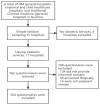Knowledge and Willingness toward Vaccination among Pregnant Women: Comparison between Pertussis and Influenza
- PMID: 36360959
- PMCID: PMC9658401
- DOI: 10.3390/ijerph192114082
Knowledge and Willingness toward Vaccination among Pregnant Women: Comparison between Pertussis and Influenza
Abstract
Background: Our study sought to characterize the knowledge and willingness levels regarding vaccinations against pertussis and seasonal influenza (influenza) among pregnant women in Guizhou province, China, which have previously been unclear.
Methods: In total, 11 hospitals that carried out obstetrics and antenatal examination services were randomly included in the target organizations, and 564 questionnaires completed by the pregnant women were collected and analyzed in Guizhou province. The questionnaires contained questions addressing awareness and knowledge of pertussis and influenza, willingness to be vaccinated at different life stages, and the basic statuses of subjects. A two-paired McNemar test was used to compare the knowledge levels on pertussis and influenza. A Friedman test was used to compare the willingness to be vaccinated at different life stages. To explore the factors influencing knowledge levels, a chi-square test and binary logistic regression were used with stepwise backward regression.
Results: In total, 11.9 percent of the pregnant women had received influenza vaccines in the year prior to their pregnancy in Guizhou province. The pregnant women had poorer knowledge of pertussis than of influenza. Given a vaccine was available, the willingness of pregnant women to partake in the following vaccination-related actions could be ranked, from highest to lowest: free vaccination of babies, recommend vaccination to family members, postpartum vaccination, vaccination of babies at mothers' expense, and vaccination during pregnancy. Knowledge levels played different roles in the women's willingness to receive vaccinations at different life stages. Common knowledge of pertussis and influenza played a limited role in the willingness to receive maternal vaccinations. Among the pregnant women, the factors influencing the low levels of pertussis knowledge were occupation as nonmedical-institution staff, lower educational level, pregnancy stage past the first trimester, and not bearing children; for influenza, the factors were occupation as nonmedical-institution staff, lower educational level, denial of pregnancy-induced disease, and lower monthly household income per capita.
Conclusions: Pregnant women have poorer levels of knowledge on pertussis than influenza, whereas there was no significant difference in their willingness to be vaccinated against these conditions. Health education on pertussis should be strengthened and we called for vaccines given at birth.
Keywords: influenza; pertussis; pregnancy; vaccination.
Conflict of interest statement
The authors declare that they have no known competing financial interests or personal relationships that could have influenced the work reported in this paper.
Figures
Similar articles
-
Cross-sectional study on factors associated with influenza vaccine uptake and pertussis vaccination status among pregnant women in Germany.Vaccine. 2014 Jul 16;32(33):4131-9. doi: 10.1016/j.vaccine.2014.06.007. Epub 2014 Jun 10. Vaccine. 2014. PMID: 24928791
-
Pregnant women's knowledge of and attitudes toward pertussis, influenza and COVID-19 vaccination.Ginekol Pol. 2025;96(7):577-583. doi: 10.5603/gpl.103799. Epub 2025 May 26. Ginekol Pol. 2025. PMID: 40418041
-
Antenatal vaccination for influenza and pertussis: a call to action.J Obstet Gynaecol. 2021 Jul;41(5):750-754. doi: 10.1080/01443615.2020.1799340. Epub 2020 Oct 16. J Obstet Gynaecol. 2021. PMID: 33063592
-
Experience and challenges on influenza and pertussis vaccination in pregnant women.Hum Vaccin Immunother. 2018;14(9):2183-2188. doi: 10.1080/21645515.2018.1483810. Epub 2018 Jul 24. Hum Vaccin Immunother. 2018. PMID: 30024822 Free PMC article. Review.
-
Epidemiological and clinical reasons for vaccination against pertussis and influenza in pregnant women.Adv Exp Med Biol. 2015;849:11-21. doi: 10.1007/5584_2014_95. Adv Exp Med Biol. 2015. PMID: 25398316 Review.
Cited by
-
Awareness and Acceptance of Pertussis Vaccination Among Pregnant Women in Taif Region, Saudi Arabia: A Cross-Sectional Study.Cureus. 2023 Jul 11;15(7):e41726. doi: 10.7759/cureus.41726. eCollection 2023 Jul. Cureus. 2023. PMID: 37575821 Free PMC article.
-
Factors associated with pregnant women's willingness to receive maternal pertussis vaccination in Guizhou Province, China: An exploratory cross-sectional study.Hum Vaccin Immunother. 2024 Dec 31;20(1):2331870. doi: 10.1080/21645515.2024.2331870. Epub 2024 Apr 4. Hum Vaccin Immunother. 2024. PMID: 38575528 Free PMC article.
-
A Sensitive Public Health Issue-The Vaccine Acceptancy and the Anti-Pertussis Immune Status of Pregnant Women from a Romanian Metropolitan Area.Children (Basel). 2023 Mar 29;10(4):640. doi: 10.3390/children10040640. Children (Basel). 2023. PMID: 37189889 Free PMC article.
References
-
- World Health Organization Fact Cheet on Influenza (Seasonal) [(accessed on 13 October 2022)]; Available online: https://www.who.int/news-room/fact-sheets/detail/influenza-(seasonal)
-
- World Health Organization Health Topics on Pertussis. [(accessed on 13 October 2022)]; Available online: https://www.who.int/health-topics/pertussis#tab=tab_1.
-
- Pertussis Vaccines: WHO Position Paper–August 2015. [(accessed on 1 July 2022)]; Available online: https://www.who.int/teams/immunization-vaccines-and-biologicals/policies....
-
- Rivero-Santana A., Cuéllar-Pompa L., Sánchez-Gómez L.M., Perestelo-Pérez L., Serrano-Aguilar P. Effectiveness and cost-effectiveness of different immunization strategies against whooping cough to reduce child morbidity and mortality. Health Policy. 2014;115:82–91. doi: 10.1016/j.healthpol.2013.12.007. - DOI - PubMed
-
- Hong E.Y., Kulkarni K., Gosavi A., Wong H.C., Singh K., Kale A.S. Assessment of knowledge and attitude towards influenza and pertussis vaccination in pregnancy and factors affecting vaccine uptake rates: A cross-sectional survey. Singap. Med. J. 2021;21 doi: 10.11622/smedj.2021097. - DOI - PMC - PubMed
Publication types
MeSH terms
Substances
LinkOut - more resources
Full Text Sources
Medical
Miscellaneous


